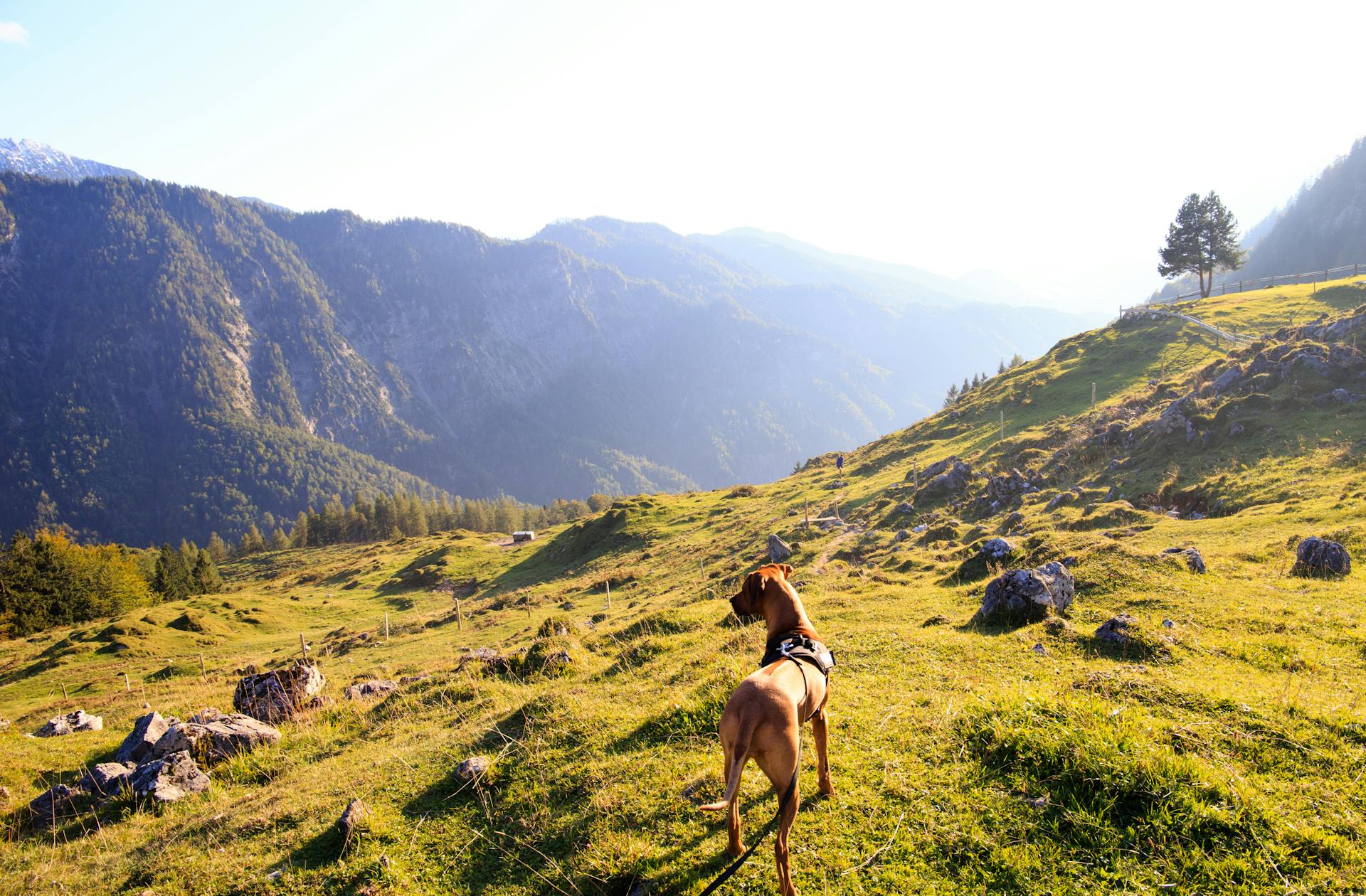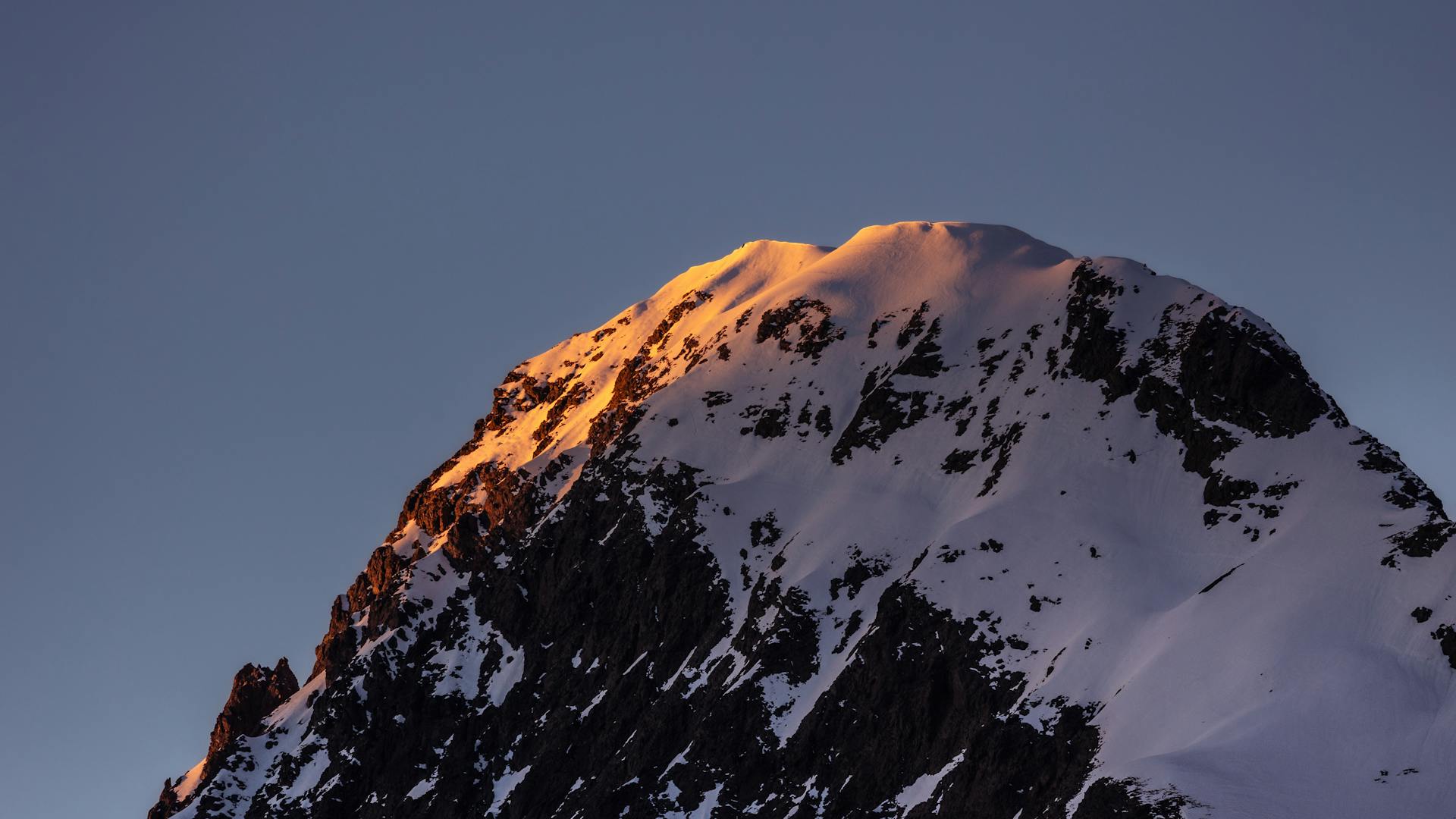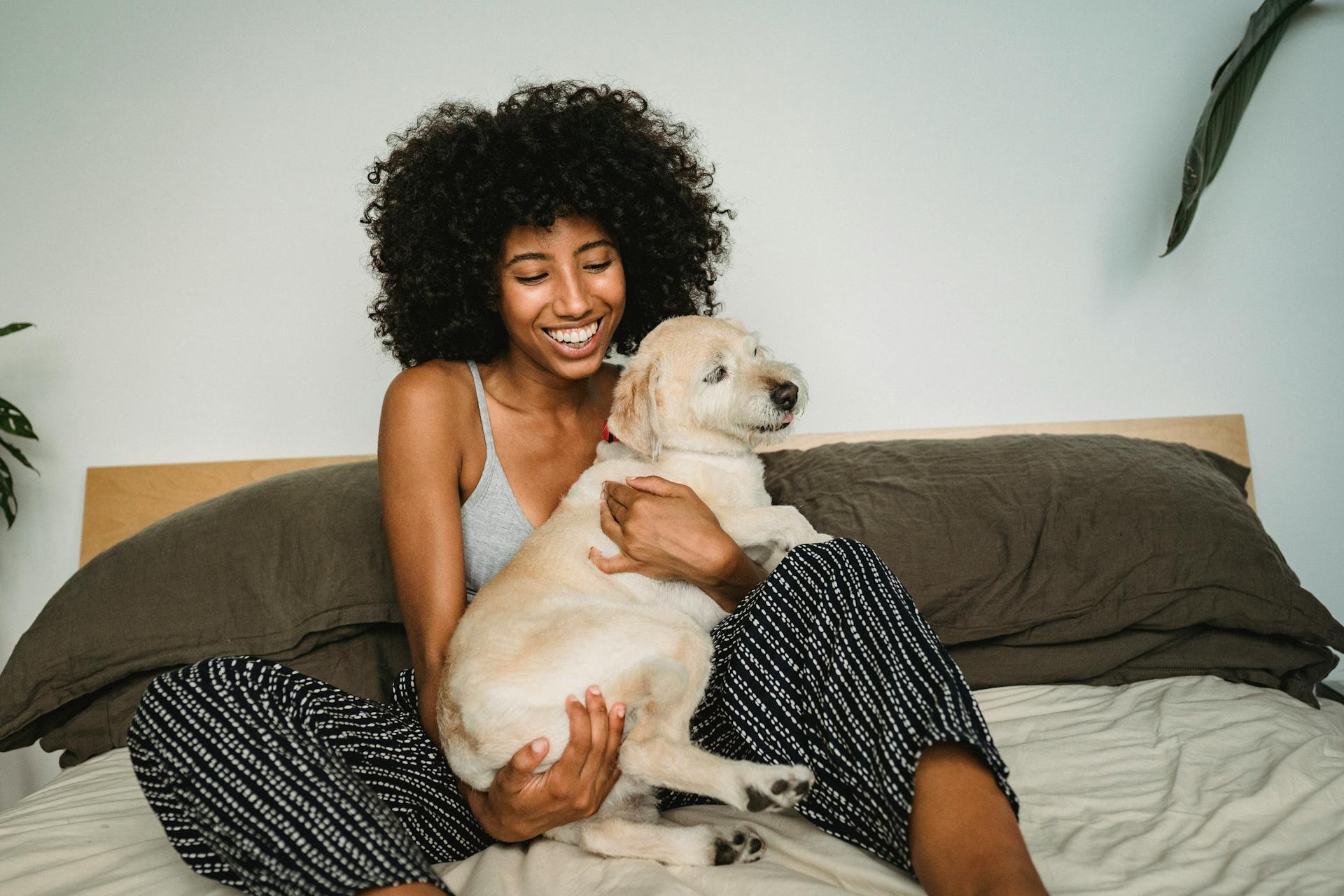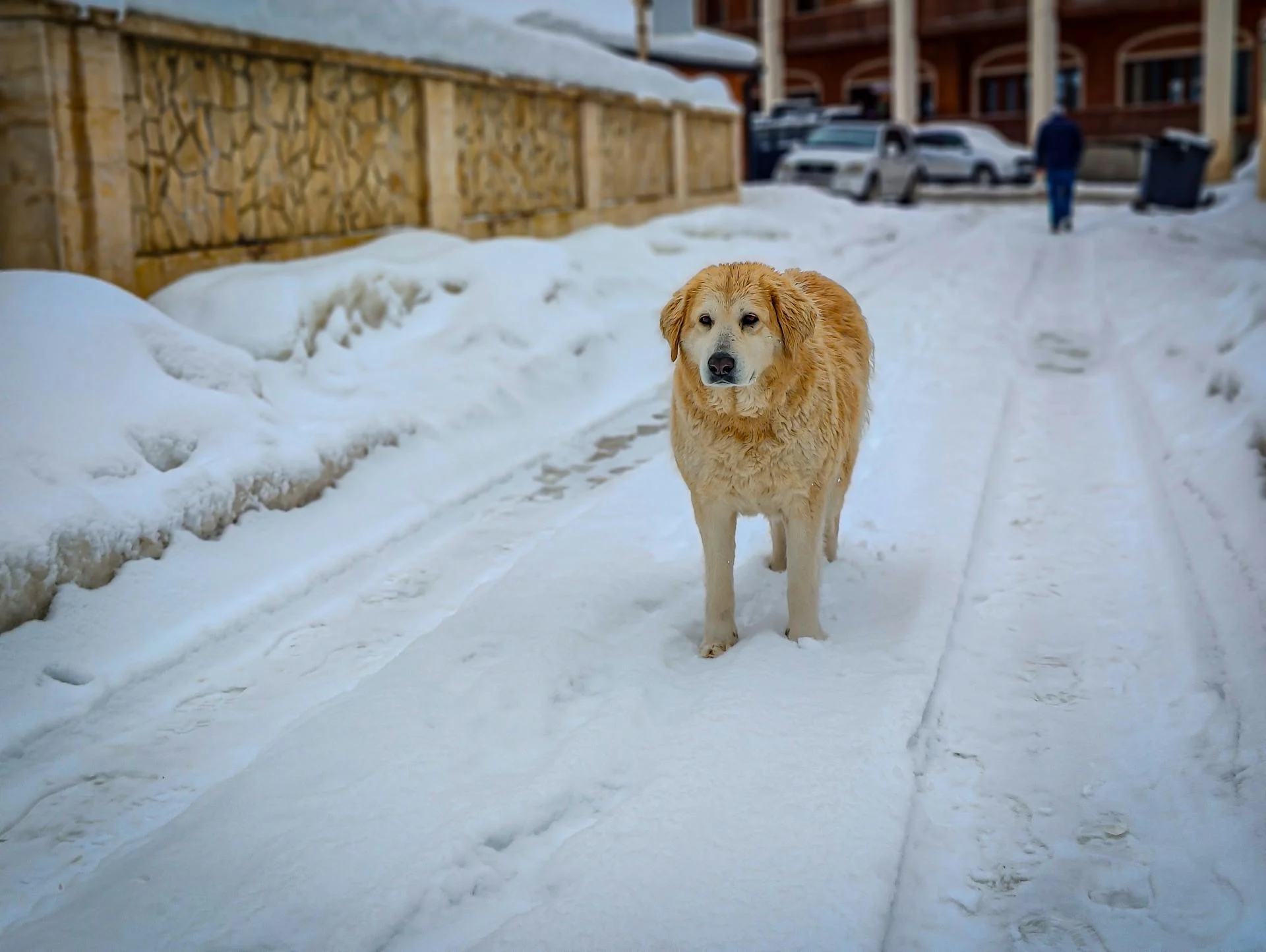
Potty training a Great Pyrenees can be a bit of a challenge, but with the right preparation and approach, you can set your dog up for success. The key is to understand the breed's unique characteristics and needs.
Great Pyrenees are large, independent dogs with a strong instinct to roam, which can make potty training more difficult. They require a consistent and patient approach to learn good habits.
To start potty training your Great Pyrenees, it's essential to establish a routine and stick to it. This means taking your dog outside to the same spot each time to do their business, ideally immediately after meals, naps, and playtime.
Great Pyrenees are intelligent and responsive to positive reinforcement, so be sure to reward your dog with treats and praise when they do their business outside. Consistency and patience are key to successful potty training.
Consider reading: Can Great Pyrenees Sleep outside
Preparation and Planning
Starting potty training early is key, and consistency is crucial. Choose a designated potty spot outdoors and stick to a routine.
Puppies can start learning as early as eight weeks old, and it's easier for them to pick up good habits at this young age. Consistency is also crucial for reinforcing the behavior.
A good guide for a housetraining schedule is that dogs can control their bladders for the number of hours corresponding to their age in months up to about nine months to a year.
Monitor daily events and your puppy's habits when setting up a schedule. With very young puppies, you should expect to take the puppy out frequently, especially after meals, naps, and playtime.
Here's a rough estimate of how often to take your puppy out:
- First thing in the morning and last thing at night
- After playing indoors
- After spending time in a crate or upon waking up from a nap
- After chewing a toy or bone, eating, or drinking
Scolding a puppy for soiling your rug isn't going to do much. Praising a puppy for doing the right thing works best for everything you will do in your life together.
Reward your puppy with one of their favorite treats, and make sure they're nice and small, easy for your puppy to digest. If your dog has an accident, clean up the mess and use a cleaner that eliminates odors to remove the scent.
Before beginning your puppy potty training journey, make sure you are equipped with a few necessary items. By having these objects on hand, you are ensuring that any moment can become a teaching moment.
Training Techniques
Positive reinforcement is key to successful Great Pyrenees potty training. Praising your dog after they go potty outside is essential, and be effusive in your praise – cheer, clap, throw cookies. Reward your puppy with one of their favorite treats, and make sure they're nice and small, easy for your puppy to digest.
It's best to reward your dog immediately after they finish going potty, as dogs have a short memory and may not connect the reward with the action if there's a delay. This is crucial to forming the correct association.
Crate training can be a lifesaver when you're not home to supervise your Great Pyrenees. Dogs will do their best to avoid using the bathroom in their crate, making it a comfortable and safe spot for them to be in while you're away. Adhere to the one hour per month of your puppy's life rule at the minimum, but it's best to be back to give your dog a break more often than that.
Worth a look: Alternatives to Crate Training
Dogs are clean creatures and don't like a urine-soaked rug in their living spaces. If you let your dog lose control in their crate, they'll get the idea that it's OK to mess up their living space, so be sure to clean up any accidents promptly.
Positive reinforcement is an effective training method that rewards good behavior instead of punishing bad behavior. When your Great Pyrenees successfully goes potty outside, offer praise, treats, or playtime as a reward.
Additional reading: Great Pyrenees Behavior Problems
Creating a Schedule
Creating a schedule for your Great Pyrenees puppy's potty breaks is crucial for success. Puppies can only hold their bladder for a number of hours corresponding to their age in months, up to about nine months to a year.
A good rule of thumb is to take your puppy out at least every 2-3 hours, and after meals or naps. For example, a 6-month-old puppy can reasonably be expected to hold it for about 6 hours.
Recommended read: Do Great Pyrenees Have 6 Toes
Puppies have tiny bladders and need to go out frequently, so it's essential to monitor daily events and your puppy's habits when setting up a schedule. You should expect to take your puppy out:
- First thing in the morning and last thing at night
- After playing indoors
- After spending time in a crate or upon waking up from a nap
- After chewing a toy or bone, eating, or drinking
Here's a rough guide to potty breaks based on age:
Remember, all puppies are individuals and the timing will differ for each. Be sure to adjust the schedule according to your puppy's unique needs and habits.
Potty Training Basics
Potty training a Great Pyrenees puppy requires a consistent schedule and attention to their subtle cues.
Start by establishing a routine that takes your puppy's age into account. For every month of age, your puppy can hold their bladder for one hour. This means a one-month-old puppy needs to go out every hour, while a four-month-old puppy can wait for four hours.
You should also be aware of your puppy's behavior, such as sniffing, circling, or whining, which indicates they need to go out. Great Pyrenees are known to show these signs when they need to go potty.
Worth a look: 3 Week Old Great Pyrenees Puppy
A good rule of thumb is to take your puppy out:
- First thing in the morning and last thing at night
- After playing indoors
- After spending time in a crate or upon waking up from a nap
- After eating, drinking, or chewing a toy or bone
This may require frequent trips outside, especially for young puppies. Consider arranging for a dog walker or a trusted person to take your puppy out if you work in-person.
By being mindful of your puppy's cues and following a consistent schedule, you can help them learn to go potty outside and reduce the likelihood of accidents.
Discover more: How to Get a Female Dog to Pee outside
Troubleshooting
Troubleshooting common issues with Great Pyrenees potty training can be frustrating, but it's not uncommon. Sometimes, a physical issue is the culprit, and a veterinary checkup can help identify the problem.
If your vet finds that your dog is healthy, it's time to seek professional help from a trainer or behaviorist with experience in this area. They can provide personalized guidance to get your dog back on track.
Here are some common complaints that trainers have encountered:
- Soiling their crate, which can be a sign of a dog that was previously confined for long periods and had no other choice but to eliminate in their kennels.
- Other issues that require a fresh start with crate and house training.
To address crate soiling, follow these steps:
- Assess how well your dog can control their bladder and bowels when not in the crate.
- Carefully control their diet and schedule.
- Give frequent trips outside, including after every meal, first thing in the morning, and last thing at night.
- If you work, consider hiring a dog walker.
- Clean everything so there are no odors left.
Recurring Accidents in Same Spot
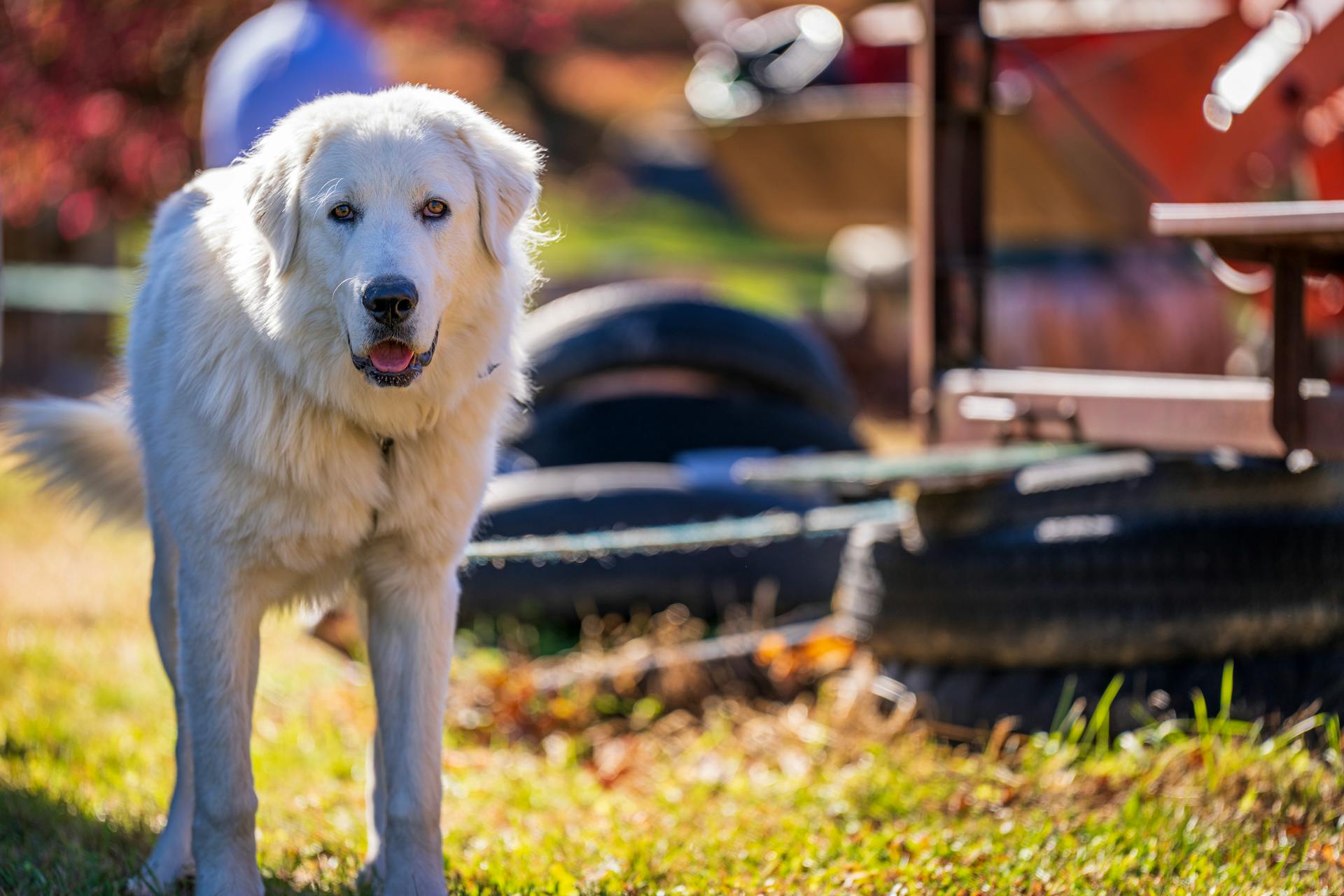
Recurring accidents in the same spot can be frustrating. This is often due to the lingering scent of previous accidents, which can attract your dog to the same area again.
You may have already cleaned the area, but if you didn't use pet stain enzymatic cleaners, the smell may still be present. Make sure to use these cleaners and follow the instructions carefully to remove the odor completely.
Declaring victory too soon can also lead to recurring accidents in the same spot. Even if your puppy is consistently doing what you want, stick to the schedule to reinforce good habits.
For more insights, see: Training Dog to Pee in One Spot
Accident in Crate
If your dog soils their crate, it's often a sign they're still learning to control their bladder and bowels. Dr. Burch says dogs who come from situations where they were confined for long periods and had no other choice but to eliminate in their kennels will often soil their crates.
You may have to go back to square one with crate and house training. To do this, assess how well your dog can control their bladder and bowels when not in the crate. Carefully control their diet and schedule to prevent accidents.
Give frequent trips outside, including after every meal, first thing in the morning, and last thing at night. If you work, consider hiring a dog walker to help with this. Clean everything so there are no odors left.
Dogs are den animals and will seek out a little canine cave for security, which makes it relatively easy to train your dog to love their crate. The crate should be the right size – just large enough for the dog to lie down, stand up, and turn around.
Intriguing read: Crate Training Potty
Troubleshooting Common Problems
House soiling can be a sign of a physical issue, so it's essential to rule out any underlying health problems before moving on to behavioral solutions.
A good veterinary workup should be done before the several month mark if your dog is having trouble with housetraining.
Common complaints that trainers encounter include a dog who seems impossible to housetrain.
Finding a trainer or behaviorist with experience in addressing this issue can make a big difference.
Understanding Puppy Behavior
Pay attention to your Great Pyrenees' body language and habits, as they can give you clues when they need to go, such as sniffing, circling, whining, or scratching at the door.
Puppies have tiny bladders and can only control their bladders for the number of hours corresponding to their age in months up to about nine months to a year.
Monitor daily events and your puppy's habits when setting up a schedule, and be prepared to take them out frequently, especially after playing indoors, eating, or drinking.
Here are some common signs that your puppy needs to go:
- Sniffing
- Circling
- Whining
- Scratching at the door
Remember that all puppies are individuals and the timing will differ for each.
At What Age to Get a Puppy?
You can bring a new puppy home as early as 8 weeks old, but it's essential to consider your lifestyle and ability to care for a puppy before making a decision.
Some breeds, like Great Pyrenees, can begin potty training as early as 8 weeks old, while others may take longer to mature and learn.
For more insights, see: Great Pyrenees Kills 8 Coyotes
It's crucial to establish a routine and provide a stable environment for your puppy to thrive, regardless of their age or breed.
You can start teaching basic commands and housebreaking skills to your puppy as early as 8 weeks old, but be patient and remember that every puppy is different.
House Boundaries
You can start potty training your Great Pyrenees puppy as early as 8 weeks old.
Puppies do not yet have all the necessary functions and control that they will have as they age, so they need to use the restroom much more often than their older counterparts.
Monitor your Great Pyrenees' behavior and habits, as they can give you clues when they need to go. Common signs include sniffing, circling, whining, or scratching at the door.
To prevent accidents, take your dog outside immediately if you notice any of these behaviors. In time, you'll be able to anticipate your dog's needs.
Take a look at this: Great Pyrenees Exercise
If your dog has an accident, don't make a fuss, just clean up the mess and use a cleaner that eliminates odors to remove the scent, so the dog won't use it in the future.
Crate training can be a helpful tool in potty training your puppy. Dogs are wired to not want to soil their crates, so if you show your puppy that the crate is all for them, they will take ownership of it.
A crate that's too large can actually lead to more bathroom accidents, so make sure to get a crate that's the right size for your puppy.
See what others are reading: Why Do Great Pyrenees Bark so Much
Be Patient and Positive
Potty training can be a frustrating process, but it's essential to stay patient and maintain a positive attitude. Dogs can sense your emotions, and if you're stressed or angry, it can hinder their progress. Remember that accidents will happen, but don't punish your Great Pyrenees for them.
Accidents are inevitable, especially with young puppies. Their tiny bladders can only hold for a few hours, and they'll need to go out frequently. A good guide is that dogs can control their bladders for the number of hours corresponding to their age in months up to about nine months to a year.
To create a housetraining schedule, monitor daily events and your puppy's habits. With very young puppies, you should expect to take them out:
- First thing in the morning and last thing at night
- After playing indoors
- After spending time in a crate or upon waking up from a nap
- After chewing a toy or bone, eating, or drinking
By being patient, your puppy will be able to build up a sense of confidence. This confidence will make them learn the fine art of potty training even faster and will help each of you in the long run.
Broaden your view: Will a Great Pyrenees Attack an Intruder
Frequently Asked Questions
Are Great Pyrenees difficult to train?
Great Pyrenees can be challenging to train due to their strong-willed and independent nature. Establishing yourself as the pack leader early on is crucial for successful training.
Are Great Pyrenees easy to house train?
Yes, Great Pyrenees are relatively easy to house train with consistent rules and observation of their behavior. Establishing a routine and recognizing their communication cues can make the process smooth and successful.
Sources
- https://iheartdogs.com/7-secrets-to-quickly-potty-training-a-great-pyrenees/
- https://www.akc.org/expert-advice/training/how-to-potty-train-a-puppy/
- https://www.db-farms.com/beyond-the-barn/o2qv41rsnnivf9hee6x86xw3x03t5k
- https://www.dogspringtraining.com/tips/housetraining-adult-dog/
- https://www.diggs.pet/blog/pet-parenting/how-to-potty-train-a-puppy/
Featured Images: pexels.com
